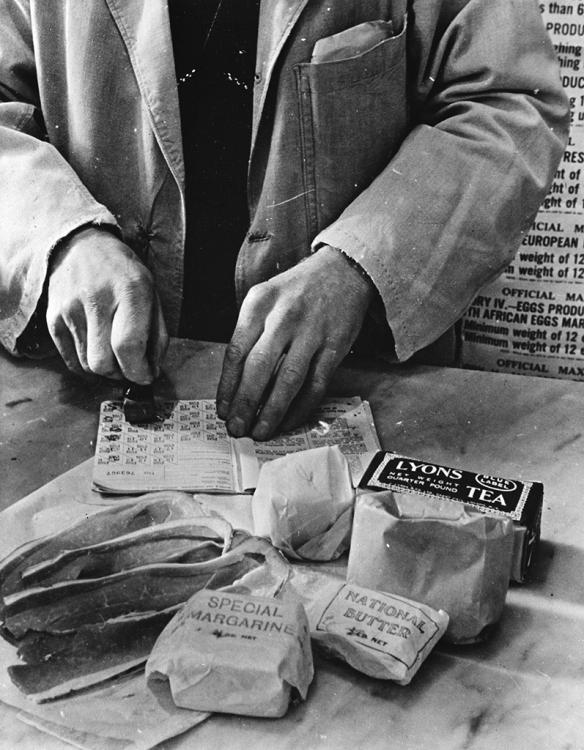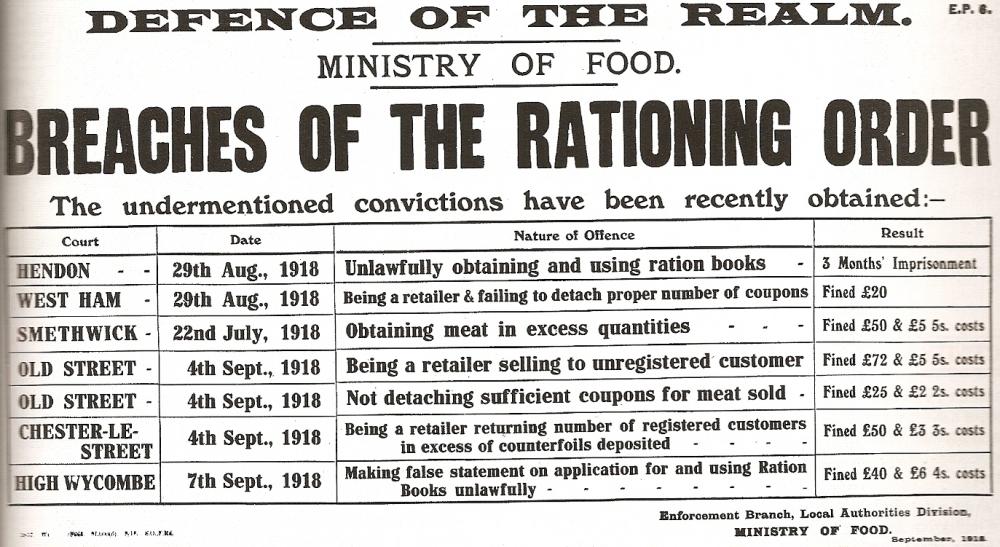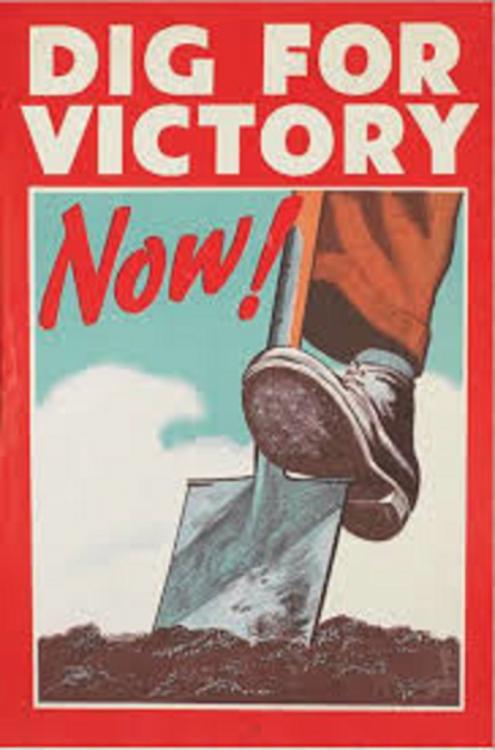3. Original Sin
So how did this misplaced, undeserved reputation of British food arise?
There are suggestions that it began in the Victorian era, when a strict religious and moral regime warned against the dangers of actually enjoying anything! It is a controversial theory, however. Although food was not consumed with the gusto of say the 18th century, the appetite for good food was never totally subdued.
Rather, the two world wars are really to blame. WWI led to rationing being introduced and this was repeated to even more strict and devastating effect in WWII. As an island nation, Britain, which imported around two-thirds of its food, found itself very short of supplies as the enemy were torpedoing supply ships. As a result, people had to make do with what they could get. They did remarkably well, so much so that many medical and nutritional experts believe people were generally more healthy then, than now.
On the 8th of January, 1940, bacon, ham, sugar and butter were put on ration, to be soon followed by meat, cheese, margarine, eggs, milk, tea, breakfast cereals, rice and biscuits (cookies). Vegetarians (there were very few of those) could trade their meat allowance for extra cheese. Vegans hadn't been invented yet!
By 1942, almost all food was rationed except vegetables, fruit, fish and bread. (Clothing, shoes, soap and fuel were also rationed.) It should also be noted that although vegetables, fruit, fish and bread were never rationed, the supply was still limited and unreliable. Fish was expensive, too, as the fishermen demanded high returns for what was more dangerous work than usual. Bread and potatoes were rationed, but after the war, in 1946 -1948 and 1947 respectively, due to bad harvests caused by poor weather.
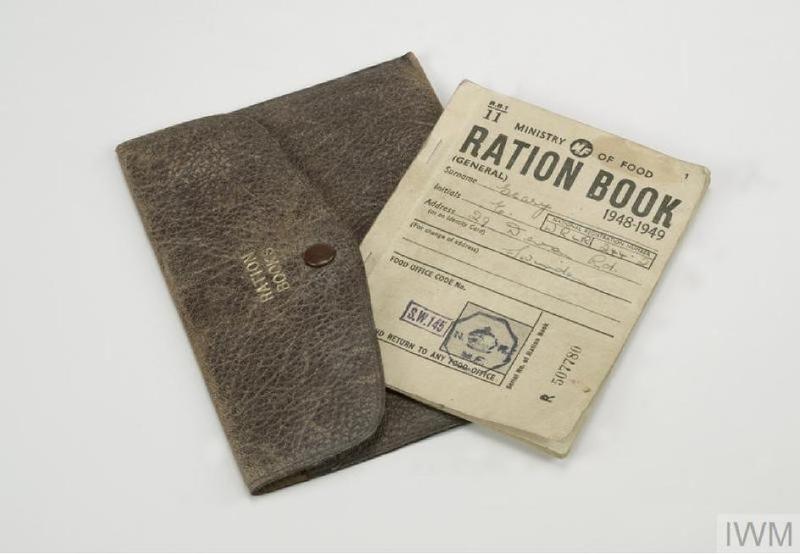
Public Domain image
And when I say rationed I mean rationed! Everyone man, woman and child was issued with a ration book with tickets which had to be given up at the stores, with which you had to register, in exchange for not very much at all. You had to register with different stores for different foodstuffs – a butcher, a baker, a general grocer etc. There were very few supermarkets, then.
The palaver of checking and processing the ration regulations meant that service was slow, leading to long queues at most shops.
British grocer cancelling tickets in ration book - Public Domain Image
Prices were set by government to prevent profiteering. However, black market foodstuffs were traded by what were called ‘spivs’, but penalties were severe if they were caught (many were – usually reported by citizens who saw them as traitors to the war effort.) To call someone a ‘spiv’ is still a strong insult in Britain.
Public Domain
A typical ration for an adult was 4 oz of bacon or ham, other meat to the value of one shilling and two pence (which could buy you approximately two chops or equivalent), 2 oz of butter, 2 oz of cheese, 4 oz margarine, 4 oz cooking fat (lard), 3 pints of milk, 8 oz sugar, 2 oz of tea, 1 fresh egg (plus varying amounts of dried egg, when available. This much-hated egg substitute was imported from the USA on ships which were often the target of blockades by the Germans).
Note that this was the ration for an adult for ONE WEEK, although it was supplemented by 12 oz of sweets (candies) every 4 weeks and 1 pound of jam (usually made from marrows) every 2 months.
Sausages were unrationed, but were usually made with the dregs of the butchers’ tables (and floors) and were highly prone to exploding The term ‘bangers’ was coined during WWI, but was revived by WWII. Game meats such as rabbit and pigeon was also off the ration, but only really available to rural people.
QuoteIn May 1942, an order was passed that meals served in hotels and restaurants might not cost over five shillings (equivalent to $17 USD in 2019) per customer, might not be of more than three courses, and not more than one course might contain meat, fish or poultry.
In order to alleviate the shortages of vegetables, all parks, sports grounds, village squares and any other plots of vacant land were converted into gardens and a "Dig For Victory" campaign was launched to encourage people to grow their own food.
Fruits such as bananas and lemons were imported pre-war, so they disappeared for the duration of the war and beyond. My cousin first tasted bananas and ice cream in a British hospital in the late-50s. He thought the bananas were a joke and asked that the ice-cream be heated up as some idiot had served it stone cold!
Some imported spices were difficult to find during the war. Herbs less so. (Lucky that British food “never uses herbs and spices”, wasn’t it?)
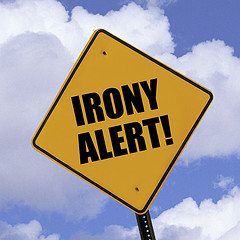
This rationing meant that a whole generation of British women just never learned to cook. Mothers weren’t going to let their daughters experiment in the kitchen; one mistake and the family did not eat that day. You couldn’t run out and buy something else. (Note: Assuming only women and girls would be cooking is not me being sexist. That’s how it was then. The men were nearly all away fighting and anyway, in those days cooking was considered “women’s work” by the vast majority.)
The British government’s Ministry of Food, issued a series of pamphlets telling people how to get the most from their limited supplies – some of them make grim reading today. Radio broadcasts backed these pamphlets up.
All rationing ended on the 4th of July 1954, nine years after the end of the war, although shortages continued for some time after.
In the 1960s, with a booming economy and the advent of cheaper travel, people started holidaying in Europe, particularly France, Spain and Italy. This brought them into contact with different foods again and the cuisine began to recover, aided hugely by writers such as Elizabeth David and Jane Grigson. By the 1970s, British cuisine was well on the way to recovery.
So this unfair, dishonest demonisation of British food actually only refers to a brief moment in the country’s long history, roughly 70 to 80 years ago. And the temporary decline in food standards was no fault of the British.
There was very little disparagement of British food prior to WWI, as people ate well. What little there was can usually be attributed to simple propaganda. Napoleon was said to have dismissively called the British a nation of beef-eaters, yet according to a contemporary document, while in exile on St. Helena, every day his household and he got through 23 kilos of beef and veal, plus 23 kilos of mutton or pork plus a roasting pig, 31 kilos of bread, 42 eggs and 15 bottles of milk, two turkeys, four ducks, two geese, 12 pigeons and nine other fowl, all. Washed down with fifty bottles of wine, malt liquor, rum and cognac. Nothing there that Britain wasn't consuming, too.
Heston Blumenthal’s 2-Michelin-starred London restaurant, Dinner with Heston only serves British food from pre-war recipes. The current on-line menu lists dishes from between 1390 and 1850.
Pre-COVID, there was a rich vibrant food scene in the UK, the equivalent of any, and with restrictions beginning to be lifted, that will probably return very soon.
But some people prefer the lazy stereotytpes, even when the evidence is staring them in the face.
Finally let me deal with one comment.
QuoteBritish food was considered bland, boring, and brown. …, I understand why people say/said that, especially as across the way is France.
The worst cook I know was my late mother. She was French, but moved to Britain as a nine-year-old refugee at the start of the war, so never learned to cook or even eat good food. The idea that French people are all somehow genetically great cooks and gourmets is just another nonsensical myth. I’ve been served some inedible garbage in French restaurants in France. Sure, the top end is great and often, small places can surprise you with wonderful food, but that is just as true in Britain, if not more so!
Here is an interesting oral history video with British people remembering what it was like to live under rationing in the war.


